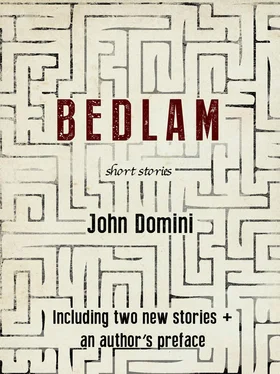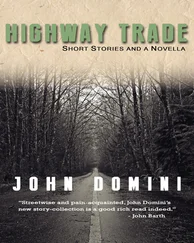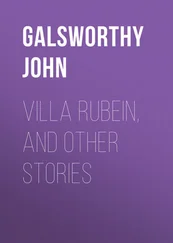time ago a very wealthy…woman
wanted to ensure that her son would
get into heaven. A church offered
to guarantee this to her, provided
she paid the church an enormous sum….
The woman paid but her son did not get
into heaven. In…revenge she used up
her remaining wealth to have a sign put
up in the skies of heaven so that throughout
all eternity those who saw…
Yet this sign is unreadable. I can’t imagine a more hogwild hope, cartwheeling and cranky like a child’s, and at the same time I can’t imagine one more meanly and permanently gutted, betrayed behind the back. But I can imagine, nonetheless, the way the dead and their visitors come to see it.
Yes imagine, because I never saw that sign. I never traveled so far. But the ghosts…see them come to see it. All assemble out of far places, blots and shafts of deeper darkness approaching across a dark muculent expanse. The dead world’s atmosphere hangs in thick dollops of goo, so that when the faces at last appear they’ve pressed through these treacle curtains unexpectedly, and very close. Faces — faces I know at once I’ve encountered only through the reflecting plastic of my radio dial, through their distant living voices that changed shape at a touch of my fingers. These people come, press past the curtains, come. Awkwardly they plump down beside me or rise like erratic bubbles, unfinished souls of every description gathering closer, feebs and jerks — grotesques maybe, stained with the slime of their locale, satanic or drab or…my hands are trapped, my chest pinned and caving in…their hard surfaces are decaying till, like honey, like gum, we bend in the brainless wobble of a wave, pressing nearer still , and my heart itself caves in, at which moment we’re made over finally together into a single uncomprehending whirl. We move in a circle around ourselves.
Before us dangle the undying figures of the sign. Hieroglyphs in limitless frieze, a bedlam of wrinkles and typefaces steaming from the imprint, bodies themselves. Feel the pieces shiver, the tremors sap the ground surface. Hear…the roar, the static and roar…
WHAT I DID
YOUR LAST EXAMPLE ( written in lipstick )
“From the first big moment to the last big moment — from the first little moment to the last little moment—
Honey babe — we had our chances but I just couldn’t care. I’m not even sure what happened.’’
PHYSICAL DETAIL
At times these days I’ve felt as if I had a third hand. I’ve felt it between my other two. This third hand is visible only in unpredictable glances, glances off-angle, and it floats unattached at the wrist. Yet I will itch with its presence for hours. Time and again my senses are betrayed; time and again when I try to catch the ghost it breaks apart. Yet I continue to glimpse it, the freak, the further apprehension. If my eyes have started to water for some reason, I can just make out the hollowed palm, the winking lines of heart and fate. Fifteen separate fingertips wave across a murk of sleep-sand and tears. So a girl shrinks out of reach beyond a mirror that once tricked you with her reflection; dark men shape love songs round their cracked voices and without a move, without a move we slip into the tick-tick-tick. What is all our caring but these vacant and half-connected hands?
Now, unexpectedly, Pinnerz found himself swamped. His son was no longer in town to help. Now, no question, he had to go wangle with the construction crew. He waited till he saw the men break for morning coffee. Then he hurried up the plankway from his dig to the crew’s worksite, squeezing sideways through the gap between the granite walls of the condemned warehouse and the 4-x-4 that anchored the plywood partition against the downtown traffic. He announced that he’d need another day at least.
“Another day.” The crew foreman measured Pinnerz with a look that could be taken two ways. “Another day.”
“That would pretty much kill the week, wouldn’t it? Wouldn’t it Bud? We couldn’t get that cable in this week if we took off another day.”
But that second speaker was the nervous one in the crew. Italian or Greek, he could be seen jawing every time a person looked over from the dig. Pinnerz knew he could be ignored. But the crew foreman, though he didn’t look at the talker, didn’t change the way he was sizing up Pinnerz either.
“I could talk to somebody else,” Pinnerz began, “if—”
“No call to do that,” the foreman said.
Pinnerz couldn’t believe he’d made such a bonehead move.
“I make the decisions here,” the foreman said.
“Yeah, hey. Bud makes the decisions here.”
Nod. “Sure.” Nod and smile. Pinnerz realized that the uproar about his son, especially since the girl involved was still staying at Pinnerz’s house, had thrown off his concentration.
“Sure, Bud. Sorry.”
The foreman’s look grew softer again, heavier through the jowls.
“Or that is,” he said, “if I say you should get another day, then it’s more than likely you’ll get another day.”
Pinnerz opened his stance to try and catch whatever breeze there was. He broke off eye contact. The rest of the crew slouched without speaking, backs propped unprotected against jagged large pieces of pavement, faces shaded by their helmets’ short brims. The wrappers of their candy bars or donuts poked up stiffly from their meaty grips. Pinnerz thought of lizard-necked old card sharks settled in for a few serious hands. This at ten-thirty in the morning.
But on an urban dig — so he himself had told the TV people, when they’d taped a spot a couple weeks ago— sometimes what mattered least was what you knew about archaeology. Particularly at a dig like this one, a rush job forced by an improvement in the public transportation. As delicately as Pinnerz broke down a soil sample, here, he had to be that much more delicate about when he chose to go over the foreman’s head. And no dropped button or coin was ever so iffy as Bud’s look. Those three-quarter-mast eyelids and the droop at the corners of the mouth, a loose-muscled scrutiny that might suggest a sneer at the visitor or might instead be a simple playing-down of the whole situation. Such calculations were measured in the fraction of a wrinkle. In fact a get-together with a crew like this, despite their beef and grime, could turn on something as tricky as the emphasis given a single syllable. By now Pinnerz got some enjoyment out of all the balancing necessary: PhD versus dropout, desk job against manual labor, a man who ate dry salad for lunch against those who had donuts or candy at every coffee break. He had to carry his point through these as if shepherding a bubble up a chimney.
“Anyway, Henry,” the foreman said, “I thought you had them bones all figured out yesterday. I thought your son was going to do that.”
“Didn’t work out.”
The foreman’s eyes hitched up, and Pinnerz understood that he’d spoken too roughly.
“Look, Bud. Bones are difficult. It’s not just a matter of radiocarbon dating, and anyway radiocarbon dating would take time too.”
“You told us that already, Henry. You told us that two days ago.”
Another bad move. With one hand Pinnerz opened the neck of his shirt a little more, and touched the sweat already in the hollow at the base of his neck.
“Now we were planning to go in there today, Henry. We got some cables to get in there.”
Pinnerz was nodding again, holding himself carefully eye-to-eye with Bud and letting the man have his say. Thank God he’d built up some goodwill before this. Thank God that when the TV people had come, he’d had sense enough to make sure they got Bud’s side of the story as well as his own. Indeed that visit had provided a kind of backdrop for today’s. A kind of rehearsal. For the cameras Pinnerz had dressed down, just a working stiff, while this morning he’d chosen a good white short-sleeve and pants with a crease, in order to have that extra hint of authority. More considerations very different from what he’d gone to school for. But he could tell the DPW’s men felt the same; he could hear the way Bud now plumped up the words “public servant.” Even Pinnerz’s first name had become a stage prop.
Читать дальше












